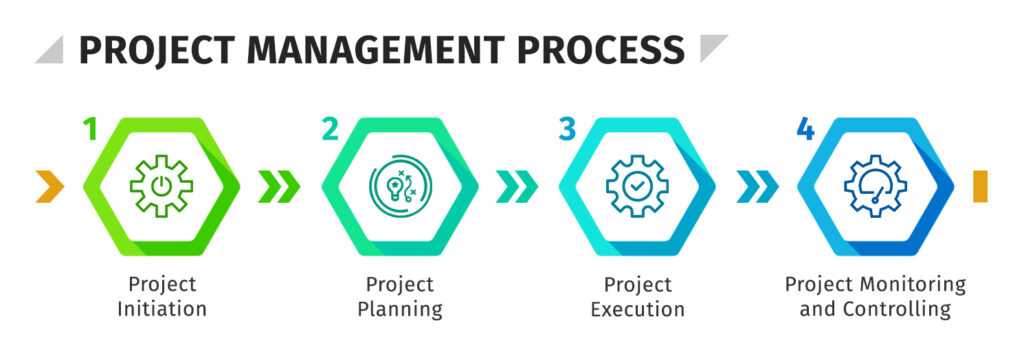Our reviewers evaluate writing courses independently. Learn how we stay transparent, our methodology, and tell us about anything we missed.

Do you know the essential HR project manager skills? Read to learn about their abilities.
Project management is a tough job, from initiation and planning to executing, controlling, and closing a project. HR project managers are responsible for planning HR projects, assembling teams, and managing time and cost. In addition to using robust project management tools to keep everything organized, HR project managers have various useful project management skills to get the job done.
So, what are those project management skills?
In this post, we explore the primary skills every HR project manager should have, both hard and soft skills.
In project management, hard skills are important as they are project management techniques that allow project managers to do their work. Also called technical skills, here are the ten important project management hard skills:
As an HR project manager, you must know about different project management methodologies. A project management methodology consists of a set of processes used to complete large tasks. These can help structure, standardize, and manage techniques for executing tasks.
There is no need for expertise in all of them since they are industry-specific and require certification. You should know the project management knowledge areas and project management process groups.
People with the right skills in your project team are the core of your project’s success. Human resource management involves keeping your team happy and productive and always backing up resources. But, productivity and budget will have an impact if many people are working on one project.
HR project managers are also responsible for training their team members in project management approaches that appear to be the best fit for their project.
Project planning is an important project management skill as the project plan is the foundation of the project management cycle. It involves project schedules, resources, and costs. Mastering this skill is planning to the extent that you are always ahead and know what comes next.
The project scheduling process is also crucial while writing the project plan. An HR project manager uses a schedule to organize tasks, teams, and time to complete a project. Project scheduling involves scheduling deadlines, deliverables, and resource and risk management.
Risk management, particularly human resources, is a major part of any project management approach. Project managers identify potential risks during a project lifecycle that may harm the project. They must create an effective backup plan with efficient reporting, and the response process is an essential aspect of project management within organizations.
Before project execution, creating a risk management plan to identify, assess, and control risk assessment is vital. Project managers must have the experience and ability to pinpoint anything going wrong and implement a risk mitigation strategy.
By tasks, we mean little jobs that make up the execution stage of project management. We must create, organize, assign to team members, and track these tasks to ensure they meet the project constraints. This is possible with task management. Project management software helps you handle tasks and foster collaboration among your project team.
Forming lists, using text editors, and building spreadsheets are all forms of task management. Great task management can increase productivity, control errors, and keep everyone updated, so it is up to the HR project manager to use the best task management approach for the situation.
Time is an irreplaceable resource, and as an HR project manager, you will need to develop processes that ensure project completion on time. Project managers must be able to create a project timeline and maintain deadlines throughout the project lifecycle. You must also be able to control how much you spend on particular activities to increase productivity and effectiveness.
Time management also involves setting priorities, which is important in project management and scheduling. Project supervision and time management skills play a vital part, and the trick is to start the right processes and introduce appropriate systems to provide the best results for the project.
Working together helps spark innovation, grow specialized skills, improve productivity, and take worthwhile risks. As an HR project manager, you must work with your coworkers to delegate responsibilities, handle conflicts, assess performances, and guide team members to help them improve their skills. Also, project managers must ensure everything runs smoothly inside the team. They also need to coordinate team members to ensure the completion of work on time and within budget.
Cost management is an important skill for human resources project managers since accurate cost estimation is the basic component for the successful completion of projects. The main goal of cost management is to control and monitor the cost with the right accounting during the lifecycle and the use of resources in a cost-effective way.
It also helps with checking on project costs and ensures the project net spend doesn’t increase the allocated budget at any time.
A project manager can do limited work with two hands. Therefore, they need to have a toolkit of applications backing them up. Project management tools are available for every task, work style, team structure, and department need. These tools help relieve an administrative workload burden.
From shared online calendars to visual resource planning applications, HR project managers must know how to use these applications.
If you want to brush up on your management skills, check out the HR.University’s HR manager course.
The number of technical skills human resources project managers have can elevate them from average to professional at speed. Basic design skills or the ability to read or develop code are valuable hard skills as they are tangible. For a project manager, it is important to have at least two unique and intersecting skills. This way, you stand out as a niche expert that people who need your skills can’t do without.

Soft skills are those that people develop naturally. However, you can improve some of these through practice. Following are the ten main project management soft skills:
According to a paper from the Project Management Institute, project managers spend 90% of their time communicating. Good communication, both verbal and nonverbal, is essential for project success. You must communicate clear instructions and descriptions across digital channels with great effectiveness. Communication allows you to establish business objectives, create plans, negotiate, and implement strategies.
Open and clear communication also builds a bridge between teams, stakeholders, clients, and contractors. It keeps all people on the same page and well-informed. Also, frequent communication with clients can help decide project budgets, future steps, and potential risks.
You must know the communication strategies and improve current communication modes by updating yourself on recent technologies.
To ensure your projects and initiatives succeed, you need more than organizational knowledge and HR skills. The ability to manage conflicting ideas and priorities across stakeholder groups and navigate this difficulty will help you avoid potential project issues and obtain the information and support required for a successful project.
Effective HR project managers also respect their teammates’ time, so it is essential to be able to read the body language of others in the room to ensure that you stay on course.
Effective project managers need to know about all their teams’ work. Knowing the platforms and systems your teams use and the possibilities and limitations of those helps you make intelligent conversations with teams, clients, stakeholders, and vendors.
Research skills allow the project manager to find an answer to a question or a solution to a problem. They also allow the project manager to fill any gaps in knowledge that may enable them to finish multiple projects.
Strong leadership skills are essential for project managers. A human resources project manager who works as a leader will lead and manage teams, which involves setting the vision, motivating the team, and coaching team members to improve their lives. Using these skills, project managers can oversee and coordinate tasks while providing a vision and a roadmap for success.
Leadership covers several aspects, such as providing the HR team with the resources they need to achieve the goals, taking complete responsibility for their team, and delivering within budget and time.
Organizational skills involve bringing order to chaos, sorting everything out, and staying ahead of the curve. This skill is essential for project managers to work in an organized and efficient way. Project managers must have excellent organizational skills to ensure all HR processes run smoothly and in line with common objectives.
This includes multitasking, prioritizing tasks, categorizing projects, and documenting everything for easy access and future reference.
Self-confidence, relationship management, and collaboration skills are part of interpersonal skills. All these skills allow the team to work together and complete the project. Self-confidence improves the confidence of a team as a whole, increasing morale and allowing for better performance.
Relationship management skills are also important since they enable human resources project managers to develop and promote connections with team members and clients.
HR project managers are coaches in that they must bring out the best in their team and product. Coaching helps with focusing on a person’s individual requirements and talents and drawing out their potential. This involves offering positive feedback, identifying growth opportunities, considering concerns, and allowing mistakes.
Project managers can develop coaching skills on the job or during external training. Coaching skills help project managers in one-on-one or group sessions to circulate information or train others. They are also helpful in training and development situations, onboarding, re-integration, conflict resolution, and assisting frontline managers with people’s problems.
Regarding project management, negotiation is essential for conflict resolution and stakeholder management. For instance, you get demands from stakeholders that can affect the project scope. You need to give them pushback but discreetly so that all project stakeholders feel they are getting what they want. It is important for a human resources project manager to negotiate with third-party vendors, clients, and other stakeholders. They must also employ negotiation skills when working with their team also to bring everyone in line with strategic objectives.
The critical intellect is related to appropriate and responsible decision-making. So, a project manager must pay attention to detail and assess all the project details to streamline business processes and set the intended actions for the given project. Project managers must promote inclusiveness in decision-making.
Critical thinking is also an essential skill for those in leadership and managerial positions since it impacts their intellect and team management abilities. When you lead a team, you must give team members a strong sense of unity and belonging, which is possible if you have distinguishable critical thinking skills.
Creativity is the base of extraordinary problem-solving abilities. Human resources project managers must contain these capabilities as they become essential for future success. Having a solid creative intellect, you can impressively deal with project complexities. Also, you will have to overcome HR management challenges apart from project complications. This shows why companies prioritize project management candidates who show creative intellect.
Now, you have a concise overview of the 20 most crucial HR project management skills. It is important for you to improve your skills to stay at the top of your performance. This will equip you to lead your company’s HR department and company to excellence.
Here are the most frequently asked questions about HR project manager skills.
An HR Project Manager needs a mix of project management skills, strong communication abilities, and a deep understanding of HR processes. Key competencies include planning, organization, leadership, and knowledge of employee development to effectively manage HR-related projects.
Project management is crucial for HR professionals to manage initiatives such as recruitment campaigns, employee training, and organizational change. It helps ensure projects are completed on time, within budget, and meet organizational goals.
An HR Project Manager is responsible for overseeing HR projects, which include planning, executing, and monitoring tasks related to employee development, HR systems implementations, and change management processes. They also coordinate with HR teams and stakeholders to align goals.
HR professionals can improve their project management skills by taking relevant courses, such as Project Management Professional (PMP) certifications, gaining hands-on experience, and using tools like Gantt charts and project management software to better organize tasks and timelines.
Employee development plays a significant role in HR project management by ensuring the workforce has the necessary skills and knowledge to support organizational goals. HR Project Managers often lead initiatives focused on training, mentorship, and career advancement to foster growth and productivity.
Communication is essential for an HR Project Manager to effectively collaborate with team members, stakeholders, and employees. Clear communication ensures that everyone understands project objectives, timelines, and expectations, which leads to smoother execution and greater project success.
Beneficial certifications for an HR Project Manager include Project Management Professional (PMP), Certified Professional in Learning and Performance (CPLP), and certifications related to HR like SHRM-CP. These certifications help validate skills in both HR and project management contexts.
Get the weekly newsletter keeping 30,000+ HR pros in the loop.









Get our #1 industry rated weekly technical writing reads newsletter.